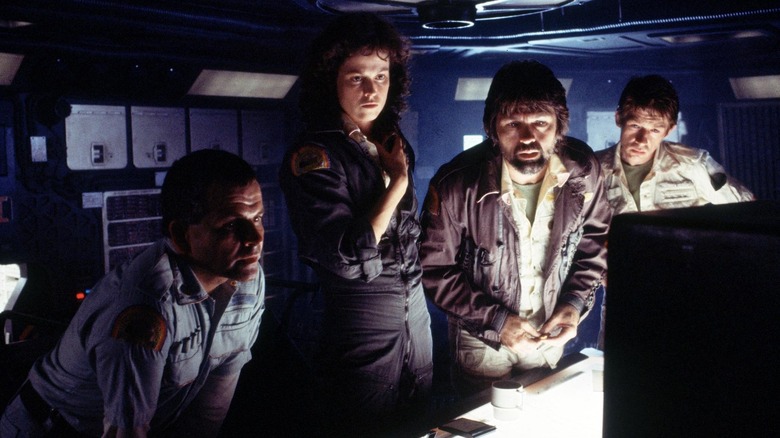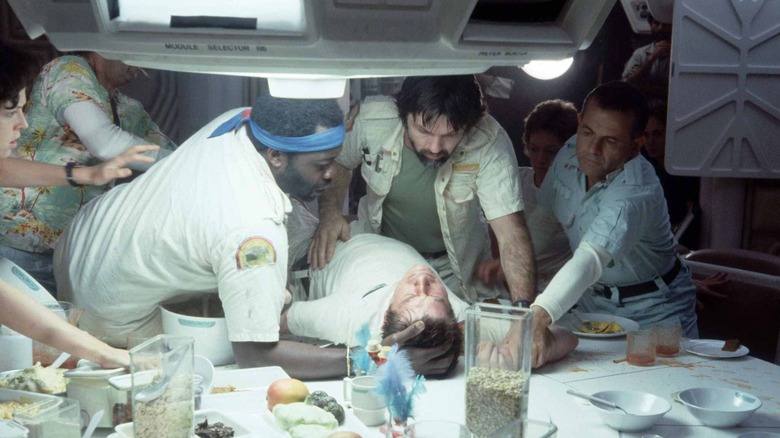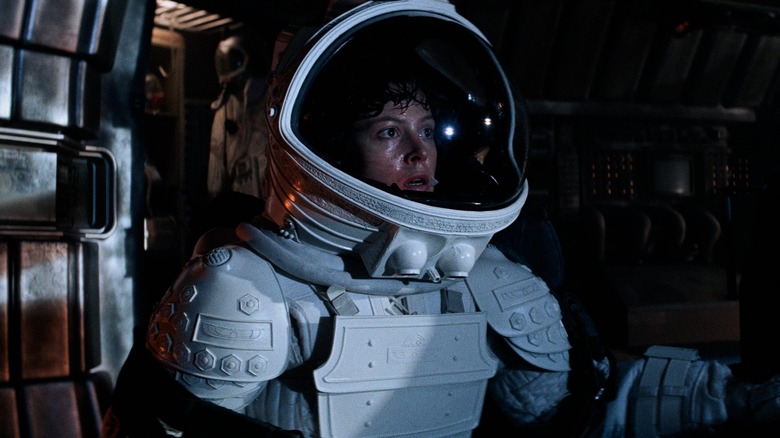How Star Wars Set Ridley Scott On The Path To Alien
The impact of "Star Wars" on popular culture and Hollywood filmmaking cannot be overstated. Many directors have commented on how George Lucas' 1977 film personally influenced their lives and careers. For Ridley Scott, however, experiencing "Star Wars" would not only change his own direction, but would also result in one of the only films that comes close to rivaling the legacy of "Star Wars" itself.
When Scott saw "Star Wars" on opening night in 1977, he had a strong and immediate reaction. Prior to the release of his first feature film, "The Duellists," at Cannes Film Festival, where it would win "Best Debut Film," Scott traveled to Los Angeles to pre-screen the movie. There, he got an opportunity to see "Star Wars" at Grauman's Chinese Theatre with his producer and friend, David Putnam. "The theater was positively boiling with expectation," Scott said in a 2019 interview with The Hollywood Reporter, and when the curtains opened, he recalls:
"It literally stopped me in my tracks. I was depressed for three months — that's my highest form of accolade — to get very depressed first, then get very competitive."
Opportunity cost
Seeing "Star Wars" placed Ridley Scott on a direct trajectory towards making 1979's "Alien." Before encountering Lucas' film, Scott had very different plans, as he has said:
"I was seriously thinking about doing 'Tristan & Isolde' next. So I looked at 'Star Wars' and thought, 'Why on earth am I even thinking about doing "Tristan & Isolde" when this guy is doing this kind of movie?'"
If 2005's poorly-received adaptation of the Celtic legend "Tristan & Isolde," produced by Ridley Scott and starring James Franco and Sophia Myles, was any representation of his original vision, maybe we should be especially grateful that he pivoted. We can also look fondly on Scott's detour into sci-fi, knowing he would not become trapped in the genre and would eventually go on to make some of the greatest historical epics of all-time.
Regardless, the timing worked out well for Scott to abandon his plans, because shortly thereafter the producers behind Brandywine Productions, with the backing of 20th Century Fox (hoping to coast off Lucas' success), offered him "Alien." Though "Star Wars" had primed Scott to accept a sci-fi project, it was the scene where the alien explodes from a character's chest that sold him on the script.
With his inaugural "Alien," Scott sought to create the "antithesis" of Lucas' work by leaning more into horror than fantasy and adding an extra layer of grit and grime to his sci-fi world than we get in "Star Wars." As different as they might be, it is the contagious effect that one creator had on the other that spawned not only expansive spin-off franchises for both movies, but generations of inspired filmmakers as well.
Nerds of a feather
While "Star Wars" may have led to "Alien," neither would have been possible without Stanley Kubrick's "2001: A Space Odyssey," released in 1968. Lucas commented on Kubrick's influences on "Star Wars" recently in the Disney Plus miniseries "Light and Magic," and Scott has said the same for his own work. Coincidentally, Guillermo del Toro has spoken on this exact topic, and has perfectly summarized the symbiotic influences of "Alien" and "Star Wars:"
"If you think about Ridley Scott and 'Alien,' the idea of truckers in space, which Ridley Scott does beautifully, and the way he made certain parts of the bowels of the ship feel worn and used and dingy. That is the crossbreeding of '2001' with 'Star Wars.' Ridley Scott is in the direct lineage of Lucas and Kubrick. His is a very different tone but he is as precise with his lensing. The areas of the ship that are pristine are very Kubrick-ian in a way, but there are parts of the ship where you can see the direct influence of 'Star Wars.'"
It is unlikely the shared influences stop there. Both directors, for example, are fans of legendary comic book artist Moebius, or Jean Giraud, whom Scott cited as inspiring the visual style of "Blade Runner" in "Future Noir: The Making of Blade Runner."
A common legacy
As sci-fi and nerd culture remained objects of stigma in the late-70s, "Star Wars" and "Alien" also share in common that their studios were not fully confident in their box office performance. Scott has lamented:
"There was a bit of holding back, and so I got a little bit angry with that, actually. I think they should have put it out full bore, immediately. The same with 'Star Wars.' They overthought 'Star Wars.' They held back 'Star Wars' and released it on 72 prints. What? That's what happened in those days."
Despite being underestimated, both would go on to massive box office success and would become pathfinders in their own right. Still, it is difficult to separate their legacies from one another. "Star Wars" showed what was possible, and "Alien" built momentum for sci-fi, while further expanding the possible on its own. Without "Star Wars" we would not have gotten "Alien," "Blade Runner," or even "The Martian," but without the two together we may not have gotten several decades of sci-fi entertainment.



